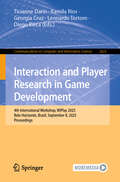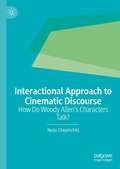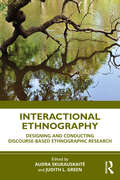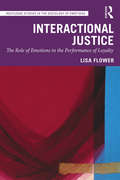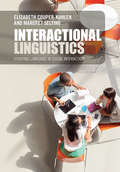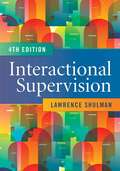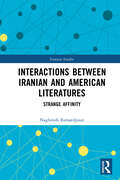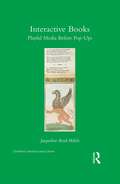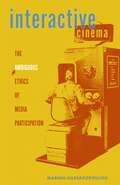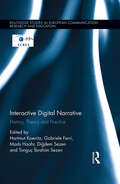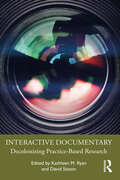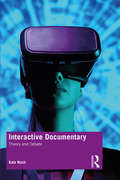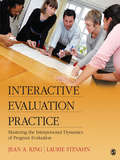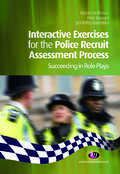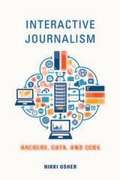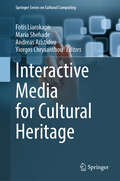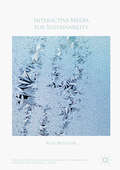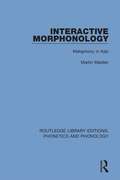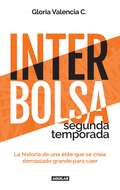- Table View
- List View
Interaction and Player Research in Game Development: 4th International Workshop, WIPlay 2025, Belo Horizonte, Brazil, September 8, 2025, Proceedings (Communications in Computer and Information Science #2623)
by Ticianne Darin Kamila Rios Georgia Cruz Leonardo Tórtoro Diego RiccaThis book constitutes the proceedings of the 4th International Workshop on Interaction and Player Research in Game Development, WIPlay 2025, which took place in Belo Horizonte, Brazil, in September 2025. The 10 full papers and 2 full papers included in this book were carefully reviewed and selected from 15 submissions. They were organized in topical sections as follows: Socially Conscious and inclusive game design; ethical game design and responsible gaming; and practical methods and frameworks for game design and evaluation.
Interactional Approach to Cinematic Discourse: How Do Woody Allen’s Characters Talk?
by Neda ChepinchikjThis book analyses and describes a segment of Woody Allen’s cinematic discourse, focusing specifically on the performed (or diegetic) interactions between actors in various roles in some of his films. It is a case study of Woody Allen's cinematic discourse, encompassing the on-screen, performed interaction in the films at the level of the story-world. The analysis focuses on speech (film dialogues), in both its verbal and prosodic forms, as well as non-verbal types of interaction including gaze and gesture, taking a social interactional approach and using multimodal conversation analysis as a theoretical framework and analytical tool. The 'texts' under study are segments from five films by Woody Allen, and the analysed interactions take place between male and female interactants, which allows further examination of on-screen interactions via a gender lens. The book aims to bridge the gap between the disciplines of applied linguistics and cinema studies and offer linguistic insights into performed interactions from a multimodal point of view. It will be equally relevant to linguists who are interested in how verbal and non-verbal language is used in cinematic discourse, as well as to film workers, especially actors, directors and screenwriters.
Interactional Ethnography: Designing and Conducting Discourse-Based Ethnographic Research
by Audra SkukauskaitėFocusing specifically on Interactional Ethnography (IE) as a distinct, discourse-based form of ethnography, this book introduces readers to the logic and practice behind IE and exemplifies the logic of ethnographic inquiry through a range of example-based chapters. Edited by two of the foremost scholars in the field of IE, this book brings together a body of work that has until now been largely dispersed. Illustrating how IE intersects with ethnographic methods – including observation, interviews, and fieldwork – the book highlights considerations relating to data analysis, researcher positionality, and the ethics of engaging participants in research. Offering examples of IE in international contexts and across a range of social science and educational settings, the book provides foundational principles and key examples of IE to guide readers’ work. This book offers researchers, scholars, and teacher educators a definitive, novel contribution to current methodological literature on IE broadly, and will be of particular use to ethnographers starting out in their career. Due to the interdisciplinary nature of the volume in illustrating the use of IE in a range of educational sub-disciplines, the book’s relevance extends to the fields of medical education, teacher education, arts and literacy research, as well as providing situated examples of IE in settings with relevance to the social sciences, anthropology, and cultural studies.
Interactional Ethnography: Designing and Conducting Discourse-Based Ethnographic Research
by Audra SkukauskaitėFocusing specifically on Interactional Ethnography (IE) as a distinct, discourse-based form of ethnography, this book introduces readers to the logic and practice behind IE and exemplifies the logic of ethnographic inquiry through a range of example-based chapters.Edited by two of the foremost scholars in the field of IE, this book brings together a body of work that has until now been largely dispersed. Illustrating how IE intersects with ethnographic methods – including observation, interviews, and fieldwork – the book highlights considerations relating to data analysis, researcher positionality, and the ethics of engaging participants in research. Offering examples of IE in international contexts and across a range of social science and educational settings, the book provides foundational principles and key examples of IE to guide readers’ work.This book offers researchers, scholars, and teacher educators a definitive, novel contribution to current methodological literature on IE broadly, and will be of particular use to ethnographers starting out in their career. Due to the interdisciplinary nature of the volume in illustrating the use of IE in a range of educational sub-disciplines, the book’s relevance extends to the fields of medical education, teacher education, arts and literacy research, as well as providing situated examples of IE in settings with relevance to the social sciences, anthropology, and cultural studies.
Interactional Justice: The Role of Emotions in the Performance of Loyalty (Routledge Studies in the Sociology of Emotions)
by Lisa FlowerInteractional Justice explores how defence lawyers accomplish their role in interaction with others and highlights the ways in which they do loyalty work – constructing and conveying loyalty in emotionally and interactionally constraining situations. By drawing on extensive ethnographic fieldnotes and interviews with lawyers, this sociological study brings their loyalty work to life and reveals to the reader the unwritten rules of emotional interactions. It presents how defence lawyers socially construct their duty of loyalty by negotiating informal and implicit professional and social expectations. This accomplishment demands emotion work and face work in order to perform a role which includes defending clients accused of heinous crimes and “losing” the majority of cases. As the defence team is central to this, the ways of doing teamwork are illustrated. Teamwork is also found to be essential between legal professionals to ensure that a criminal trial runs smoothly. All of this takes place within an overarching framework – the emotional regime of law – which aims to uphold the illusionary dichotomy between rationality and emotionality thus quietening the role of emotions. Loyalty and teamwork are features of many professions, workplaces, and aspects of social life making this book an essential tool for understanding strategies for their accomplishment. Focusing on courtroom emotions and interactions, the book suggests how trials can be made more user-friendly and provides guidance for newly qualified legal professionals. The use of ethnographic fieldnotes and interviews provides scholars and students in the social sciences, teaching, law, and medicine with a colourful monograph which reveals and explains emotion and interaction rules. It also makes this book a useful tool for teaching and understanding qualitative research methods.
Interactional Linguistics: Studying Language In Social Interaction
by Elizabeth Couper-Kuhlen Margret SeltingThe first textbook dedicated to interactional linguistics, focusing on linguistic analyses of conversational phenomena, this introduction provides an overview of the theory and methodology of interactional linguistics. Reviewing recent findings on linguistic practices used in turn construction and turn taking, repair, action formation, ascription, and sequence and topic organization, the book examines the way that linguistic units of varying size - sentences, clauses, phrases, clause combinations, and particles - are mobilized for the implementation of specific actions in talk-in-interaction. A final chapter discusses the implications of an interactional perspective for our understanding of language as well as its variation, diversity, and universality. Supplementary online chapters explore additional topics such as the linguistic organization of preference, stance, footing, and storytelling, as well as the use of prosody and phonetics, and further practices with language. Featuring summary boxes and transcripts from recordings of everyday conversation, this is an essential resource for advanced undergraduate and postgraduate courses on language in social interaction.
Interactional Supervision
by Lawrence ShulmanInteractional supervision models explained, applying supervision during the phases of work, education and evaluation roles of the supervisor, and working with staff groups.
Interactional Supervision
by Lawrence ShulmanClinical supervision is fraught with difficulties, and those who transition from frontline worker to supervisor often receive little training or support, particularly when it comes to the interpersonal skills needed for implementing complex human relations tasks. Left to their own devices, clinical supervisors must navigate myriad challenges like these real-world examples: <p><p>A supervisor decided that the evaluation process would be a good time to level with a long-term staff member about his inadequate performance. She reviewed the staff member s personnel record and discovered that previous supervisors had given the employee consistently positive and obviously false evaluations. She dreaded the approaching conference, expecting the worker to be angry. <p><p>A supervisor was asked by her administrator to back her up when staff were notified of budget cuts that would result in pay cuts and heavier caseloads. At a team meeting, one worker, who appeared to be speaking for the rest, said to the supervisor, You are going to be with us on this one, aren't you? <p><p>A recently promoted Black supervisor heard that many members of the largely White staff thought he had obtained the promotion because of the agency s affirmative action program. Nothing was said directly; however, he could sense tension in the staff group. He felt angry, hurt, and bitter at the racist element in his reception and increasingly isolated at the agency. <p><p>Drawing on decades of his own experience and the experiences of those he has trained, Lawrence Shulman provides clear, simple models of supervision using a conversational tone and practical advice in this must-have resource. <p><p>Every phase of supervision is discussed in detail, with a focus on communication, making demands for work, facing taboo subjects, and transitioning into and out of roles and relationships. Strategies for group work and meetings include everyday challenges; trauma, such as client deaths; violence against frontline workers; and cutbacks. Supervisors will learn how to apply Shulman s parallel process framework in their interactions with frontline workers to model ideal interactions between workers and their clients. <p><p>In this fourth edition, evidence-based practices and interventions are updated to include the latest ethical and legal aspects of supervision and also feminist; lesbian, gay, bisexual, transgender, queer, and questioning; and trauma-informed practice.
Interactions Between Iranian and American Literatures: Strange Affinity (Iranian Studies)
by Naghmeh EsmaeilpourIntroducing "narrative mobility" as a new approach in comparative studies of Iran and the US, this book reinterprets the politics and aesthetics of relations between the nations through an analysis of Iranian and American authors.The book focuses specifically on three authors—Simin Daneshvar, Shahriar Mandanipour, and Don DeLillo—who each employ narrative mobility to rethink intercultural negotiation, addressing parallel issues in America and Iran from different, but complementary, perspectives. The book analyzes the employment of parallel narrational techniques, presenting physically and virtually mobile characters who embody their respective countries as they move from one culture to another. The strange affinity between Iran and the US is ultimately revealed by viewing literary works as a "contact zone" through which the complicated relations and shared history of the two nations can be renegotiated. On a more theoretical level, the book reflects on the role of literature—in particular the novel as a transnational medium—as a bridge between nations in a period of globalization.With its focus on cross-cultural connections, the book will be of interest to anyone studying or researching comparative literature, US–Iran relations, and cultural studies generally.
Interactive Books: Playful Media before Pop-Ups (Children's Literature and Culture)
by Jacqueline Reid-WalshMovable books are an innovative area of children’s publishing. Commonly equated with spectacular pop-ups, movable books have a little-known history as interactive, narrative media. Since they are hybrid artifacts consisting of words, images and movable components, they cross the borders between story, toy, and game. Interactive Books is a historical and comparative study of early movable books in relation to the children who engage with them. Jacqueline Reid-Walsh focuses on the period movable books became connected with children from the mid-17th to the early-19th centuries. In particular, she examines turn-up books, paper doll books, and related hybrid experiments like toy theaters and paignion (or domestic play set) produced between 1650 and 1830. Despite being popular in their own time, these artifacts are little known today. This study draws attention to a gap in our knowledge of children’s print culture by showing how these artifacts are important in their own right. Reid-Walsh combines archival research with children’s literature studies, book history, and juvenilia studies. By examining commercially produced and homemade examples, she explores the interrelations among children, interactive media, and historical participatory culture. By drawing on both Enlightenment thinkers and contemporary digital media theorists Interactive Books enables us to think critically about children’s media texts paper and digital, past and present.
Interactive Cinema: The Ambiguous Ethics of Media Participation (Electronic Mediations #63)
by Marina HassapopoulouConnecting interactive cinema to media ethics and global citizenship Interactive Cinema explores various cinematic practices that work to transform what is often seen as a primarily receptive activity into a participatory, multimedia experience. Surveying a multitude of unorthodox approaches throughout the history of motion pictures, Marina Hassapopoulou offers insight into a range of largely ephemeral and site-specific projects that consciously assimilate viewers into their production. Analyzing examples of early cinema, Hollywood B movies, museum and gallery installations, virtual-reality experiments, and experimental web-based works, Hassapopoulou travels across numerous platforms, highlighting a diverse array of strategies that attempt to unsettle the allegedly passive spectatorship of traditional cinema. Through an exploration of these radically inventive approaches to the medium, many of which emerged out of sociopolitical crises and periods of historical transition, she works to expand notions of interactivity by considering it in both technological and phenomenological terms. Deliberately revising and expanding Eurocentric scholarship to propose a much broader, transnational scope, the book emphasizes the ethical dimensions of interactive media and their links to larger considerations around community building, citizenship, and democracy. By combining cutting-edge theory with updated conventional film studies methodologies, Interactive Cinema presses at the conceptual limits of cinema and offers an essential road map to the rapidly evolving landscape of contemporary media.
Interactive Digital Narrative: History, Theory and Practice (Routledge Studies in European Communication Research and Education)
by Hartmut Koenitz Mads Haahr Gabriele Ferri Diğdem Sezen Tonguç İbrahim SezenThe book is concerned with narrative in digital media that changes according to user input—Interactive Digital Narrative (IDN). It provides a broad overview of current issues and future directions in this multi-disciplinary field that includes humanities-based and computational perspectives. It assembles the voices of leading researchers and practitioners like Janet Murray, Marie-Laure Ryan, Scott Rettberg and Martin Rieser. In three sections, it covers history, theoretical perspectives and varieties of practice including narrative game design, with a special focus on changes in the power relationship between audience and author enabled by interactivity. After discussing the historical development of diverse forms, the book presents theoretical standpoints including a semiotic perspective, a proposal for a specific theoretical framework and an inquiry into the role of artificial intelligence. Finally, it analyses varieties of current practice from digital poetry to location-based applications, artistic experiments and expanded remakes of older narrative game titles.
Interactive Documentary: Decolonizing Practice-Based Research
by Kathleen M. Ryan David Staton Tammy Rae MatthewsInteractive documentary is still an emerging field that eludes concise definitions or boundaries. Grounded in practice-based research, this collection seeks to expand the sometimes exclusionary field, giving voice to scholars and practitioners working outside the margins. Editors Kathleen M. Ryan and David Staton have curated a collection of chapters written by a global cohort of scholars to explore the ways that interactive documentary as a field of study reveals an even broader reach and definition of humanistic inquiry itself. The contributors included here highlight how emerging digital technologies, collaborative approaches to storytelling, and conceptualizations of practice as research facilitate a deeper engagement with the humanistic inquiry at the center of documentary storytelling, while at the same time providing agency and voice to groups typically excluded from positions of authority within documentary and practice-based research, as a whole. This collection represents a key contribution to the important, and vocal, debates within the field about how to avoid replicating colonial practices and privileging. This is an important book for practice-based researchers as well as advanced-level media and communication students studying documentary media practices, interactive storytelling, immersive media technologies, and digital methodologies.
Interactive Documentary: Decolonizing Practice-Based Research
by Kathleen M. Ryan David Staton Tammy Rae MatthewsInteractive documentary is still an emerging field that eludes concise definitions or boundaries. Grounded in practice-based research, this collection seeks to expand the sometimes exclusionary field, giving voice to scholars and practitioners working outside the margins. Editors Kathleen M. Ryan and David Staton have curated a collection of chapters written by a global cohort of scholars to explore the ways that interactive documentary as a field of study reveals an even broader reach and definition of humanistic inquiry itself. The contributors included here highlight how emerging digital technologies, collaborative approaches to storytelling, and conceptualizations of practice as research facilitate a deeper engagement with the humanistic inquiry at the center of documentary storytelling, while at the same time providing agency and voice to groups typically excluded from positions of authority within documentary and practice-based research, as a whole. This collection represents a key contribution to the important, and vocal, debates within the field about how to avoid replicating colonial practices and privileging.This is an important book for practice-based researchers as well as advanced-level media and communication students studying documentary media practices, interactive storytelling, immersive media technologies, and digital methodologies.
Interactive Documentary: Theory and Debate
by Kate NashTracing continuities in digital and documentary practices, this book is a study of interactive documentary from the perspective of documentary culture. Exploring the dizzying array of new documentary forms that have emerged in the past ten years, the book is grounded in the analysis of multiple recent examples of digital documentary work, drawing out the key issues that the work raises. These issues provide a starting point for theoretical reflection, with each chapter developing concepts and frameworks to facilitate thinking with and through interactive documentary. The book explores questions of polyvocality, participation, and political voice, as well as the sociality and performativity of digital documentary practice. By thinking deeply and critically about interactive documentary practice, the book charts the many and various ways in which interactive documentaries claim the real – contingently, partially, or, in some cases, collectively. Each chapter draws on a range of examples – from digital games to data visualisations, database documentaries to virtual reality – demonstrating how we might engage with these ‘unstable’ digital texts. The book will be particularly valuable for students and researchers keen to make connections between documentary and digital media scholarship.
Interactive Evaluation Practice: Mastering the Interpersonal Dynamics of Program Evaluation
by Professor Jean A. King Dr Laurie A. StevahnYou've taken your introduction to evaluation course and are about to do your first evaluation project. Where do you begin? Interactive Evaluation Practice: Managing the Interpersonal Dynamics of Program Evaluation helps bridge the gap between the theory of evaluation and its practice, giving students the specific skills they need to use in different evaluation settings. Jean A. King and Laurie Stevahn present readers with three organizing frameworks (derived from social interdependence theory from social psychology, evaluation use research, and the evaluation capacity building literature) for thinking about evaluation practice. These frameworks help readers track the various skills or strategies to use for distinctive evaluation situations. In addition, the authors provide explicit advice about how to solve specific evaluation problems. Numerous examples throughout the text bring interactive practice to life in a variety of settings.
Interactive Exercises for the Police Recruit Assessment Process: Succeeding at Role Plays (Practical Policing Skills Series)
by Richard Malthouse Peter Kennard Jodi Roffey-BarentsenThis book focuses on the Interactive Exercise, which forms a key part of the Police Recruit Assessment Process. The role play (as the exercise is often referred to) is traditionally the part of the recruitment test that candidates worry about most and find particularly difficult. The book clearly explains the role play process, making links to the Core Competencies and in particular examining issues of diversity. It offers a number of Interactive Exercises in the form of candidate and role player instructions and provides guidance on the completed exercises.
Interactive Journalism: Hackers, Data, and Code
by Nikki UsherInteractive journalism has transformed the newsroom. Emerging out of changes in technology, culture, and economics, this new specialty uses a visual presentation of storytelling that allows users to interact with the reporting of information. Today it stands at a nexus: part of the traditional newsroom, yet still novel enough to contribute innovative practices and thinking to the industry. Nikki Usher brings together a comprehensive portrait of nothing less than a new journalistic identity. Usher provides a comprehensive history of the impact of digital technology on reporting, photojournalism, graphics, and other disciplines that define interactive journalism. Her eyewitness study of the field's evolution and accomplishments ranges from the interactive creation of Al Jazeera English to the celebrated data desk at the Guardian to the New York Times' Pulitzer-endowed efforts in the new field. What emerges is an illuminating, richly reported portrait of the people coding a revolution that may reverse the decline and fall of traditional journalism.
Interactive Media for Cultural Heritage (Springer Series on Cultural Computing)
by Fotis Liarokapis Maria Shehade Yiorgos Chrysanthou Andreas AristidouThe aim of this edited book is to provide a point of reference for the latest advancements in the different fields of interactive media applied in Digital Cultural Heritage research, ranging from visual data acquisition, classification, analysis and synthesis, 3D modelling and reconstruction, to new forms of interactive media presentation, visualization and immersive experience provision via extended reality, collaborative spaces, serious games and digital storytelling. This volume, is structured around 4 sections, focusing on different types of technologies and applications in Cultural Heritage, namely: Cutting-Edge Applications of Extended Reality in Cultural Heritage Preservation, Cultural Heritage Preservation and Exploration through Emerging Digital Technologies, Interactive and Immersive Experiences for Storytelling in Cultural Heritage and Innovative Approaches to Interactive Cultural Heritage Visualization. Interactive Media for Cultural Heritage consists of theoretical discussions and presents a range of case studies from diverse geographical locations allowing for an international focus of the book. It is addressed to academics, scholars, researchers, and students working on interactive media in cultural heritage and provides an interdisciplinary approach to enable cross-fertilization and collaboration among those research communities.
Interactive Media for Sustainability (Palgrave Studies in Media and Environmental Communication)
by Roy BendorInteractive Media for Sustainability presents a conceptually rich, critical account of the design and use of interactive technologies to engage the public with sustainability. Treating interactive technologies as forms of mediation, the book argues that these technologies advance multiple understandings of sustainability. At stake are the ways sustainability encodes the complexity of interrelated social and natural systems, and how it conveys the malleability of the future. The book’s argument is anchored in a diverse set of theoretical resources that include contemporary work in human-computer interaction (HCI), social theory, media studies, and the philosophy of technology, and is animated by a variety of examples, including interactive simulations, persuasive apps, digital games, art installations, and decision-support tools.
Interactive Morphonology: Metaphony in Italy (Routledge Library Editions: Phonetics and Phonology #16)
by Martin MaidenFirst published in 1991. The existence of morphonology had been the subject of intense debate in twentieth-century linguistic theory. Attempts to identify putatively morphonological phenomena had often foundered on the widespread assumption of a rigid dichotomy between synchronic morphological structures and the phonetic processes which historically shared them. With the difficulties of establishing any role for morphonology clearly identified, the author introduces a comparative and historical survey of the morphologization of metaphony in Italian dialects. On the basis of this the existence is argued of authentic synchronic ‘morphonological’ interaction between morphological structures and phonetic processes, such that inflectional paradigms serve to specify phonetic details of implementation of incipient sound changes. The circumstances under which such interaction may be expected to occur are discussed. This book is an important contribution to our understanding of both morphology and phonology, taking seriously the implications of abandoning a rigid distinction between synchronic morphology and diachronic phonology. It successfully integrates linguistic theory with the analysis of philological data, and indicates the direction for future research on morphonology. This detailed study of Italian dialects also constitutes a valuable addition to the study of Romance dialectology.
Interactive Science Life Science
by Don Buckley Michael E. Wysession M.Sc. Zipporah Miller M.A.Ed. Michael J. Padilla Ph.D. Kathryn ThorntonIntroduction to Living Things, Introduction to Cells, Cell Processes and Energy, Genetics: The Science of Heredity, The Code of Life, Change Over Time, Plants, Animal Life Processes, Introduction to the Human Body, Controlling Body Processes Populations and Communities, Ecosystems and Biomes, Balance Within Ecosystems.
Interaktion zwischen Spezies: Fremdheit und Nähe (Vital Turn: Leib, Körper, Emotionen)
by Anna K.E. SchneiderWie gestalten sich Mensch-Tier-Interaktionen? Anna Schneider nähert sich dieser Frage gestützt auf Theorien des Symbolischen Interaktionismus, der Philosophischen Anthropologie und Leibphänomenologie sowie verschiedenen Empathiekonzepten. Die Autorin erörtert hierfür ausführlich zwei Fallstudien zur Erkundung von Mensch-Tier-Interaktionen im privaten Umfeld (Mensch-Hund) und im institutionellen Rahmen einer Auffangstation (Mensch-Raubkatze). Sie stellt die speziesübergreifende Interaktion als dialektischen Prozess dar, welcher auf verschiedenen Ebenen vollzogen wird und entscheidend von den Faktoren der Annäherung und Abgrenzung zum Anderen geprägt ist. Die komplexe Methodik und hohe Interdisziplinarität der Arbeit verdeutlicht dabei den Bedarf an innovativen Forschungsmethoden für eine inklusive Mensch-Tier-Forschung und bietet einen theoretischen und methodischen Bezugsrahmen für zukünftige Forschung.
Interaktive Exkursionen: Konzeption – Vorbereitung – Durchführung (essentials)
by Florian Weber Georg Glasze Robert PützIn diesem essential wird praxisorientiert dargestellt, wie interaktive Exkursionen im Hochschulkontext von Studierenden vorbereitet und moderiert werden können. Ausgangspunkt bildet der Ansatz eines „lehrenden Lernens“, bei dem die Studierenden zu Expert*innen für einzelne Themenbereiche werden. Kern des Konzepts sind exkursionsdidaktische Drehbücher, die von Kleingruppen ausgearbeitet werden. Mit Tipps zur Wahl von Standorten, zur Exkursionsleitung und zur interaktiven Gestaltung von einzelnen Exkursionsblöcken stellt das essential die „Werkzeuge“ vor, die für eine erfolgreiche Gestaltung von Exkursionen notwendig sind.
Interbolsa segunda temporada
by Gloria ValenciaLa periodista ganadora del Premio de periodismo Simón Bolívar regresa para revelarla segunda parte de uno de los desfalcos financieros más grandes de la historia reciente de Colombia. <P><P>Han pasado cinco años desde el derrumbe de InterBolsa, la otrora comisionista más grande del sector en Colombia. <P><P>Desde entonces, Gloria Valencia, quien recibió el Premio Simón Bolívar a mejor libro periodístico por su trabajo sobre este tema, le ha seguido el rastro al caso de manera rigurosa e ininterrumpida. <P><P> En este libro la autora se vuelca de nuevo sobre la investigación y sobre los expedientes judiciales; retoma sus fuentes en la Fiscalía, las conversaciones y entrevistas con personas cercanas al proceso, para revelar en estas nuevas páginas el estado actual del caso, los alcances de la justicia, la reparación a las víctimas y el castigo a los responsables. <P><P> InterBolsa, segunda temporada se convertirá en un documento de memoria histórica sobre uno de los descalabros financieros más grandes en los últimos años en Colombia, y en un libro de estudio para generaciones actuales y venideras.
